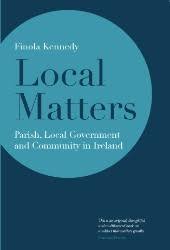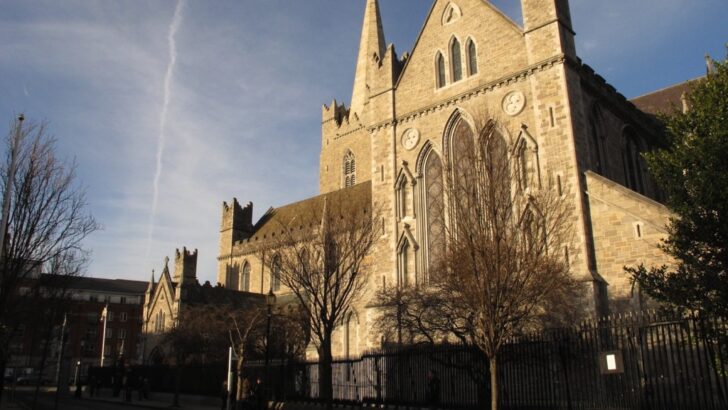Local Matters: Parish, Local Government and Community in Ireland, by Dr Finola Kennedy (Institute of Public Administration, €25.00)
Frank Litton
The philosopher Alasdair MacIntyre traced his early commitment to Marxism to his experience growing up in London’s East End where his parents worked as doctors.
It was the communists’ contributions to the neighbourhood that drew his attention to Marxist theory.
Neighbourhoods are important. The local matters. It is surprising that we pay so little attention to it. This is especially so given how much the contours of the local have changed and are changing.
Dr Kennedy’s book is to be welcomed. In demonstrating the importance of the local while tracking its changes, she brings into focus important aspects of our society and politics that are too often ignored.
For centuries, the parish has provided the frame for the local. The parish was centred on the church. The majority of those living within its boundaries shared the same faith. They came together in worship. The ideal was harmonious unity, all pulling together in one happy community.
The reality fell short of this. We are, after all, fallen, and envy, jealousy and hatred shadow our interactions. Wider social injustices play out in the parish. Nonetheless, the parish sustained a sense of communality, of mutual obligations and the possibility of cooperative endeavour that extended beyond the specifically religious.
In the distant past, especially in rural communities the parish clergy were the best educated. They were the ‘intelligentsia’ interpreting the wider world for the parishioners.
Story
My uncle told the story of a parish priest in Mayo who stood up to preach on the feast of Christ the King, just after rural electrification had reached the parish.
“Ye all know,” he told the congregation, “about Christ the King, but ye know nothing of electricity.”
He proceeded to inform, or perhaps misinform, the congregation on this new wonder.
That was then; now, as Dr Kennedy tells us, church attendance is in steep decline, vocations dwindle and parishes amalgamate as ageing priests struggle to serve their flock.
From the perspective of faith, the picture is dismal. As she recounts, the ‘City of God’ and the ‘City of men’, the sacred and the secular, were inextricably intertwined in the life of the parish with inevitable costs and benefits for both. The religious decline of the parish has implications for the secular order.
‘Relationality’ is a clumsy word. Expect to hear more of it, as the neoliberal order flounders and its assumptions are questioned. The liberal starts with the individual and the question, “how can their autonomy be protected, sustained, asserted in the unavoidable relationships that constitute social life?”
Talk of relationality instructs us that this is the wrong starting point.
Relationships precede autonomy. If all goes well, the web of relationships in which we find ourselves enable us to grow as persons with the capacities to act as autonomous agents. And the important relationships are local.
To see why this is so it is useful to consider how relationships differ. The relationships in families differ from those that bring us together in voluntary activity; these in turn differ from those in market transactions. Parents give their children what they need to grow and develop as autonomous individuals without thought of return. No bill is presented when the daughter or son reaches eighteen.
What parents provide is a ‘gift’ and the obligations of gratitude are not specific. Co-operative activities suppose an equality of exchange; what I receive should be returned in equal measure.
In market transactions, gifts or equality have no place. Traders seek to get as much from an exchange in return for as little as possible. As the saying goes to survive in the flea market you need to sell the sleeves of a waistcoat. The aim is maximising profits and as economists tell us its pursuit leads to the best possible world.
It is not quite so simple. It turns out that the co-operative spirit that encourages creativity in services and goods depends on relationships based on equality, gifts and gratitude.
We first encounter these relationships, grasp their role in human flourishing, and learn how to engage in them, at the local level.
Dr Kennedy details the many organisations nourished by the sense of belonging engendered by the parish: Macra na Feirme, Muntir na Tire, the GAA, Amateur Dramatics, the Society of St Vincent de Paul, the Legion of Mary…. The list is long, the contributions substantial.

They support democracy, albeit indirectly, as their members meet at regional and national gatherings, the local finds its place in the national picture while ensuring this recognises local realities.
Recognised
Local government has long been recognised as a key component in any design for democracy. But not in Ireland, where, as Dr Kennedy reminds us, it is a paltry, attenuated affair, dominated by the centre; more local administration than local government.
Social and cultural changes undermine the local. Reading Dr Kennedy’s comprehensive survey, rich in detail, indicates what a world with an impoverished local would be: isolated individuals, winners, or more likely losers, in a globalised economy, bereft of those relationships that form community, disconnected from the centres of power and despised by the elites that control them. This is ‘Trump Land’ whose populist politics expresses the loss, the anger, the anguish, while sustaining the conditions that provoke them.
Dr Kennedy is not a pessimist. Her survey does not deliver an overarching analysis to inform a grand strategy, the kind of thing that centres relish.
She does deliver what parishes need: examples of initiatives, adaptations, solutions, successes, that can inspire and instruct.
Every Pastoral Council should acquire and ponder this book.


 The parish of the past faces a future which will be very different.
The parish of the past faces a future which will be very different. 